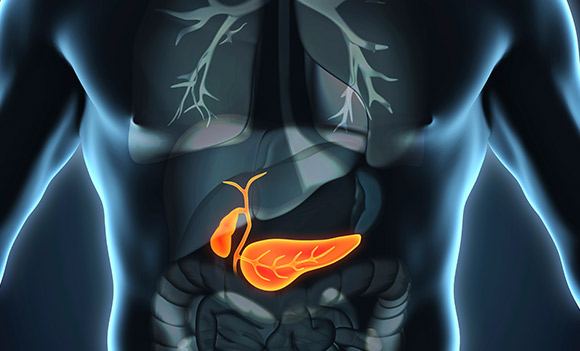ERCP
Endoscopic retrograde cholangiopancreatography may be needed to study the ducts of the gallbladder, pancreas and liver.

What is ERCP?
Endoscopic retrograde cholangiopancreatography, or ERCP, is a specialized technique used to study the ducts of the gallbladder, pancreas and liver. Ducts are drainage routes; the drainage channels from the liver are called bile or biliary ducts.
During the ERCP, your doctor will pass an endoscope through your mouth, esophagus and stomach into the duodenum (first part of the small intestine). An endoscope is a thin, flexible tube that lets your doctor see inside your bowels. After your doctor sees the common opening to ducts from the liver and pancreas, your doctor will pass a narrow plastic tube called a catheter through the endoscope and into the ducts. Your doctor will inject a contrast material (dye) into the pancreatic or biliary ducts and will take X-rays.
What Preparation is Required?
You should not have anything to eat or drink after midnight the night before the procedure to make sure you have an empty stomach, which is necessary for the best examination. You should talk to your doctor about medications you take regularly and any allergies you have to medications. Tell your doctor if you have an allergy to iodine-containing drugs, which include contrast material. Although an allergy doesn’t prevent you from having ERCP, it’s important to discuss it with your doctor prior to the procedure. Also, be sure to tell your doctor if you have heart or lung conditions, or other major diseases.
What Can I Expect During ERCP?
Some patients may receive antibiotics before the procedure. The Anesthesia department will insert a breathing tube after you are sedated. Then you will be positioned on your stomach on an X-ray table. Your doctor will pass the endoscope through your mouth, exophagus, stomach and into the duodenum.
What Are Possible Complications of ERCP?
ERCP is a well-tolerated procedure when performed by doctors who are specially trained and experienced in the technique. Although complications requiring hospitalization can occur, they are uncommon. Complications can include pancreatitis (an inflammation or infection of the pancreas), infections, bowel perforation and bleeding. Some patients can have an adverse reaction to the sedative used. Complications are often managed without surgery. Risks vary, depending on why the test is performed, what is found during the procedure, what therapeutic intervention is undertaken, and whether a patient has major medical problems. Patients undergoing therapeutic ERCP, such as for stone removal, face a higher risk of complications than patients undergoing diagnostic ERCP. Your doctor will discuss your likelihood of complications before you undergo the test.
What Can I Expect After ERCP?
If you have ERCP as an outpatient, you will be observed for complications until most of the effects of the medications have worn off. You might experience bloating or pass gas because of the air introduced during the examination. You can resume your usual diet unless you are instructed otherwise. Someone must accompany you home from the procedure because of the sedatives used during the examination. Even if you feel alert after the procedure, the sedatives can affect your judgment and reflexes for the rest of the day.
Information provided by the
American Society for Gastrointestinal Endoscopy
